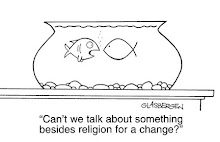
This past month or so, I've been reading John Stott's excellent book: Through the Bible, Through The Year, Baker Pub. 2006 (ISBN-13: 9780801012679). In his section on the 10 Commandments, Stott awoke within me a fresh perspective and new appreciation for the 10 Commandments. He demonstrated me to see once again that the beauty, depth and richness of these apodictic (1) commandments can be truly accessible and helpful to contemporary people.
Inspired by what I have read I recently decided to do a sermon series on The 10 Commandments. I don't feel particularly qualified, for all kinds of reasons, tackling something that significant and crucial. To be honest, before I started the series (in the back of my mind) I always sort of felt they were a bit archaic...maybe a bit outdated in their Old Testament construct.
In addition, I suspect they represent those particular passages of scripture that are so well known, that their common everyday application is usually nothing more than symbolic at worst, and "proof texty" at best. And to be completely nakedly honest, my experience with those who most often quote the 10 Commandments, often left me with the uncomfortable impression, that they tend to be highly (almost irrationally) conservative, repressively fundamentalist and "other-worldly." So much of their discussion on this topic frequently laced with those virulent cultural assumptions that defy any reasonable hermeneutic. So, I really wasn't interested in giving that perspective any more energy and reintroducing it back into circulation within my congregation.
The major problem with how many use the 10 Commandments is how to seat them contextually within the scriptures. Because the context of them is "covenantal." That is to say that Yahweh, Moses and the People of Israel, were the primary participants - not the rest of world. Does this mean that the 10 Commandants have no relevance to the "non-covenantal" people? Absolutely not! But it does and should change the manner by how we approach them with them. Significantly! We should assume observance and obedience to those who are people of the covenant. But for those who are not right now... our tact must be different. They must see it, before they can be called to believe it... Most have never seen it...
(1) Principles that are true for all people, in all places at all times. Versus the "casuistic" (or) case-laws (if this, then that...) that made up much of the rest of the Pentateuch.
Not in the sense of their irrelevant.








No comments:
Post a Comment